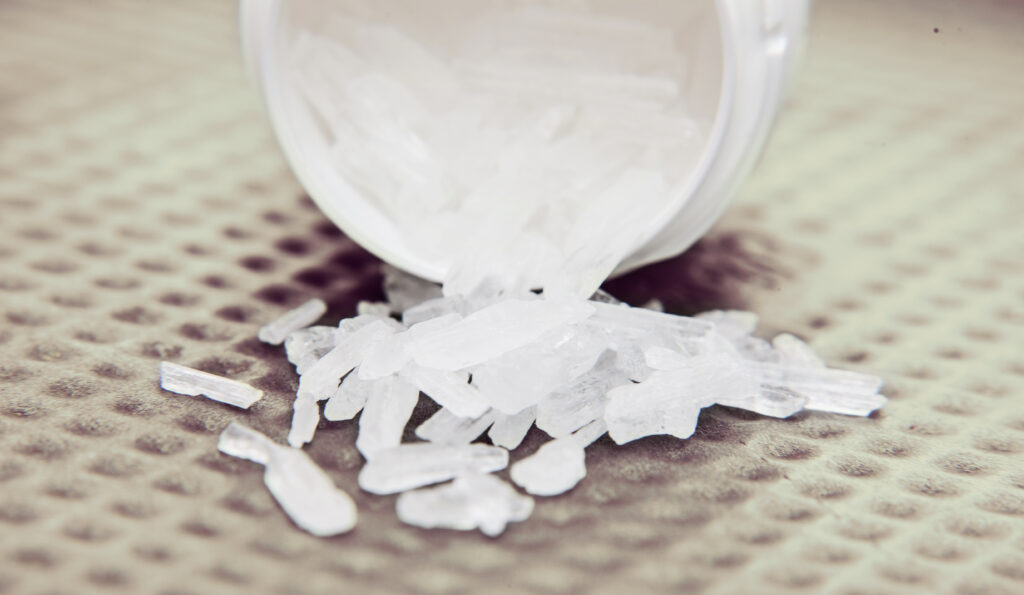Initially, a person casually using Cocaine doesn’t think it will likely lead to an addiction.
However, the appeal of the drug typically lies in how the substance works in the brain and body and the unique impacts that set it apart from other substances.
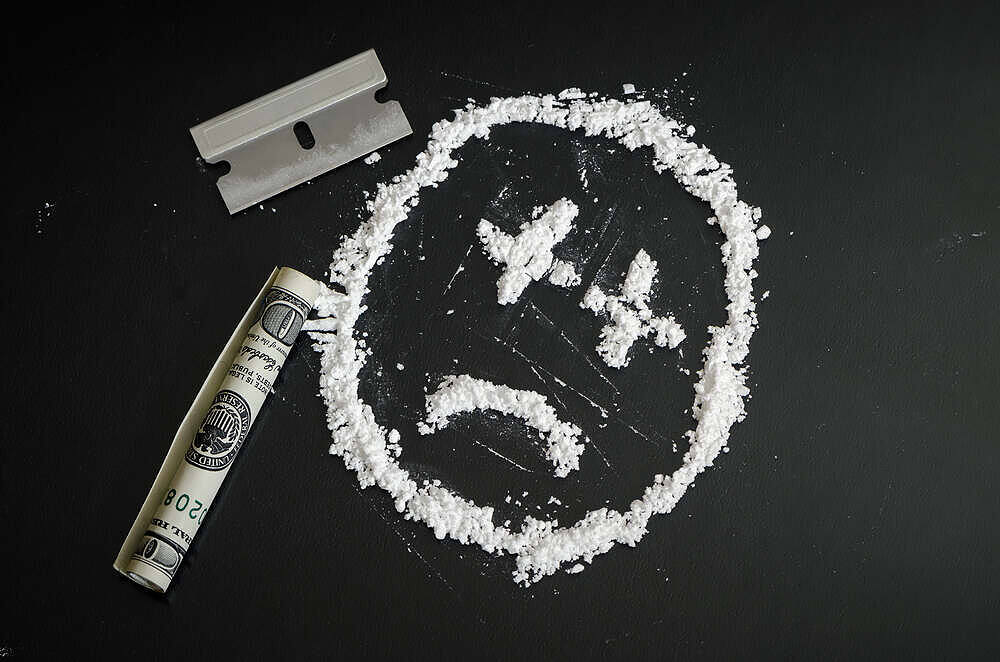
Cocaine addiction is a neurological disorder characterised by withdrawal symptoms upon cessation of cocaine use.
Usage increases brain and nervous system activity. As it does, the brain floods with natural ‘feel-good’ chemicals at unusually high levels, producing an intense sense of pleasure and reward, high energy and motivation, and a sense of confidence and mastery. It’s no wonder people manifest an addiction to Cocaine so quickly.
Cocaine use in the UK
Cocaine is the second most popular illicit substance in the United Kingdom, following cannabis.
In the year 2019, approximately 1 million individuals in England and Wales were estimated to have used powdered cocaine, while 180,000 individuals used crack cocaine.
The number of deaths related to cocaine usage in the UK has reached its highest point ever. Since 2012, these fatalities have risen by fivefold. It is believed that cocaine misuse was responsible for around one out of every seven drug-related deaths in 2018.
The production of cocaine has significantly increased over the past decade, resulting in greater availability of the drug.
How Does Cocaine Addiction Happen?
The initial appeal of the cocaine drug typically lies in how the substance works in the brain and body and the unique impacts that set it apart from other substances.
- Usage increases brain and nervous system activity.
- The brain then floods with unusually high natural ‘feel-good’ chemicals.
- This creates an intense sense of pleasure and reward.
- The individual experiences high energy, motivation, confidence, and mastery.
Many people develop a Cocaine addiction quickly because their reward system is vulnerable to its effects.
Who uses cocaine?
Individuals from various walks of life consume powdered cocaine.
The primary consumers are typically young men below the age of 30, and approximately one-third of powder cocaine users have higher incomes.
It is often taken recreationally in conjunction with alcohol and substances like MDMA (also known as ecstasy).
The majority of powder cocaine users do not exhibit dependency on the drug. However, the increased accessibility and potency of cocaine have resulted in a growing number of individuals becoming reliant on it.
Crack cocaine is typically consumed in episodes of excessive use, commonly referred to as “binges,” where an individual consumes large quantities of the drug over a few consecutive days. It is frequently combined with other substances or alcohol.
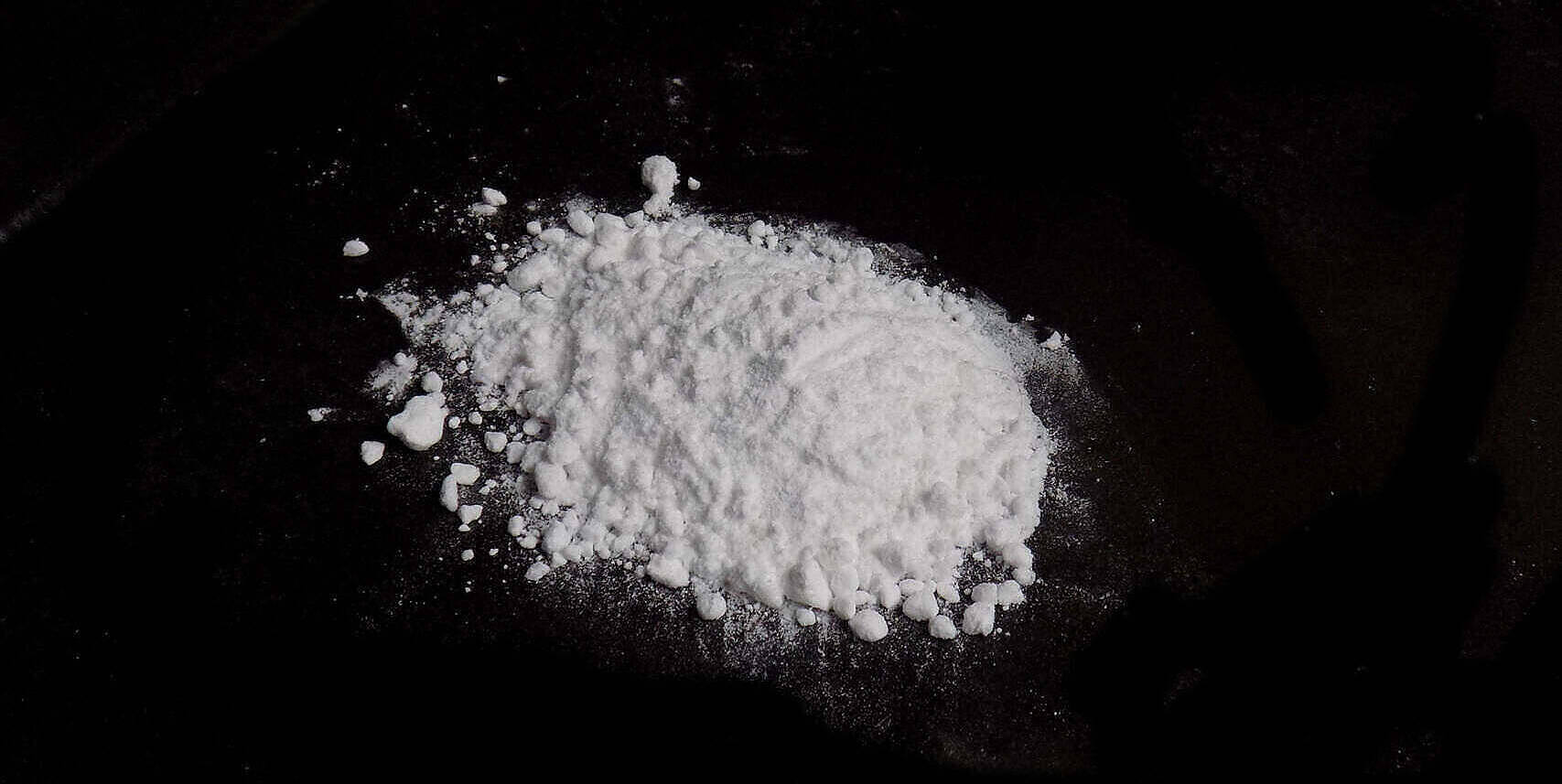
Who is most likely to become dependent on cocaine?
Cocaine addiction has the potential to impact individuals regardless of their background or personal history. Nevertheless, specific individuals are more susceptible to developing a cocaine dependence, such as:
- Those with a familial background of drug or alcohol dependency.
- Individuals who have easy access to cocaine, either due to financial means or the influence of those around them.
- Individuals who have endured traumatic experiences during their childhood.
How do I know if I’m addicted to Cocaine?
People often struggle to determine whether they have become dependent on Cocaine, and that’s because the signs and symptoms of cocaine addiction will vary from person to person to receive the desired outcomes.
Many people find themselves trying to source Coke every time they have a night out; that may not mean you have a problem, as it all depends on how often you go out. For instance, if you have a night out every month and find yourself snorting Coke because it’s easily accessible through friends, then you may not have an issue at the moment.
If you go out every weekend and find yourself planning and sourcing your coke supply before you go out, you may have a cocaine addiction or are on your way to getting one.
Heavy cocaine addiction could be described as taking the substance every day.
If you are wondering if you are addicted to using Coke, ask yourself the following questions.
- Have you built up a tolerance for it? If so, you must take it more frequently to achieve the desired results.
- Constantly think about the next time, and you’ll get to use it again.
- Spend much of your time and money getting the drug that you don’t take care of essential things in your life, such as school, work or family.
- Keep using it despite the problems it causes you.
The good news is that people can and do stop using drugs.
Cocaine Addiction Symptoms
Cocaine is a potent and addictive drug that can be misused in several different ways. It can be snorted, injected, and smoked.
One of the reasons many individuals become dependent on Cocaine is that they believe it is not a harmful drug. Not fully aware of the short-term outcomes of taking the medication can partly lead to becoming Cocaine addicted.
For instance, the substance creates a fleeting, intense high, instantly leading to a comedown, the classic drawback of addiction. It can bring on negative moods, edginess, anxiety, insomnia and loss of appetite. They may also invariably crave more of the drug, resulting in addiction.
Users must also be aware of the long-term symptoms of taking the drug. It can affect a person’s sleep pattern and cause them to lose weight by not eating, leading to malnutrition.
Those living with cocaine dependence can suffer from various psychiatric problems;
- Poor decision-making skills
- Uneasiness
- Irritability
- Psychosis
- A brief state of euphoria
- Apathy
- Confused exhaustion
- A sudden excess of confidence
- Mood fluctuations
- Delirium
- Anxiety
- Depression
People with an addiction may experience tactile and auditory hallucinations, culminating in severe depression. When this occurs, ongoing psychiatric treatment may be needed.
Users may also display the physical signs of cocaine relapse.
The drug affects the body in many ways, short-term and long-term:
- Liver, kidney and lung damage
- Damage to blood vessels in the heart and brain
- Increased heart rate,
- Sweats
- Persistent nosebleeds
- Excessive perspiration
- Loss of appetite
- Weight loss
- Bursts of energy
- Reduced need for sleep
- Enlarged pupils.
- Addiction
- Blood infections
- High blood pressure
- Heart attacks and strokes
- Sudden death.
Statistics and Trends
Official figures in the UK reveal that cocaine deaths have reached their highest numbers since records began. Last year, reportedly, cocaine abuse levels in the UK saw drug poisoning deaths come to record figures.
It had seen fatalities in parts of the country rise by 16%, considered the highest since 1993. Records state that most deaths occurred in young men between 30 and 49.
Many attribute the rise in mortality rates to a heightened purity of the drug, making it far more dangerous. The Office for National Statistics states that 432 deaths were related to the Class A drug in 2017.
There was a time when some thought only the rich or famous could fall prey to coke addiction. However, thousands of people across the UK may partake on the weekend or a night out. They may misguidedly believe alcohol and Cocaine go together to make for an enjoyable evening. But alcohol and Coke can be a dangerous combination.
Cocaine and Alcohol
Statistics show you have a twenty times more chance of sudden death if you take both substances together rather than use Coke alone.
One of the most severe problems with mixing alcohol and Coke occurs when the two metabolise through the liver. The organ produces cocaethylene, which can build up in the body and stress major organ systems, particularly the cardiovascular and liver systems.
Cocaethylene temporarily enhances the high associated with both Cocaine and alcohol, but this euphoria also increases blood pressure, aggressive and violent thoughts, and poor judgment. It will build up to toxic levels in the liver. An increase in cocaethylene can also be linked to sudden death.
Signs of Cocaine Abuse
You can help someone you know get the help they need by recognising signs of cocaine use. This will allow you to make a better assessment.
There are many signs associated with an addiction to Cocaine that can be observed in a person’s appearance and general behaviour. It’s also essential to consider the long-term behavioural symptoms of addiction.
Cocaine typically causes the person using it to be very talkative, energetic and confident. It also creates a sense of improved well-being, making them social, excitable and even more sexual. A user may seem “pumped up” for no reason. In many instances, they may also have a diminished appetite, dilated pupils, and disrupted sleep.
Paranoia, excessive aggression, lack of judgement, delusional thoughts and hallucinations are all behavioural signs of cocaine addiction.
Snorting Cocaine
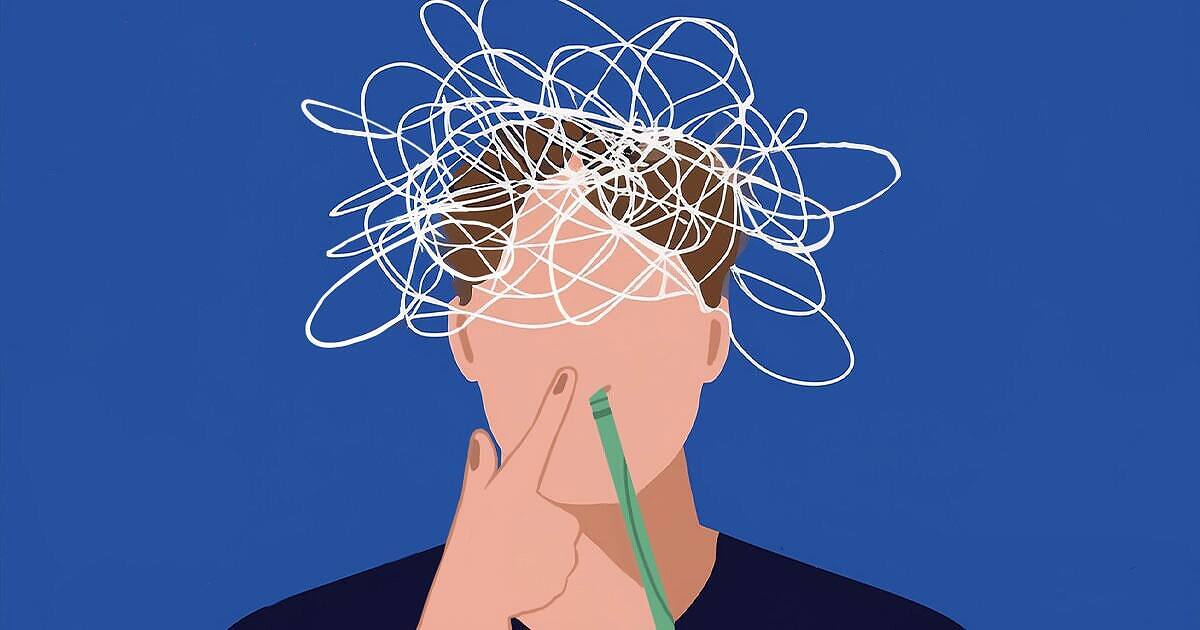
One of the main tell-tale signs of addiction is the presence of small, trace amounts of white powder around their nose. Sometimes, a person on the drug will also get a runny nose. If someone has a coke habit for an extended period, they may get nosebleeds frequently.
When people snort cocaine, they often arrange the powder in straight lines on a flat surface like a mirror. They use a rolled-up banknote as a makeshift straw to snort the cocaine.
Upon snorting, the powder enters the nose and is absorbed into the bloodstream, reaching the brain and causing euphoric effects.
There are risks in administering the drug. Some choose to snort powder cocaine, often called nasal insufflation. In powdered form, the drug is regularly cut into lines and can be sniffed through a straw, a rolled-up banknote or a scrap of paper.
However, for those either experimenting with Cocaine or have an addiction, snorting can be hazardous. It can cause bleeding and widespread damage to the tissue around the nose and nostrils. The effects of snorting the drug can begin rapidly but may only last for up to half an hour. They can lead to physical conditions such as sinusitis, hoarseness, loss of sense of smell, and swallowing problems.
Injecting Cocaine
If someone injects the drug rather than snorting it, there may be physical signs of use, such as needle marks on various body parts, including the arms, legs, hands, feet, and neck. Someone who smokes Cocaine may show physical signs of cocaine use, such as burned fingers or lips.
Injecting the drug, known as “shooting”, is the most dangerous drug administration method.
Converting it into a solution quickly creates the most significant levels in the bloodstream.
Injecting can result in numerous health problems, such as vein collapse, vasoconstriction, or the narrowing of the blood vessels. It can bring ear ringing, audio distortion, and tinnitus, commonly called a bell ringer. Those battling addiction also face the danger of blood-based infections and a high risk of overdose.
Smoking Cocaine
Cocaine base (crack) is smoked, either alone or on marijuana or tobacco. When smoked, cocaine gives one of the most powerful highs. Crack is made by cooking cocaine powder with baking soda and then breaking it into small pieces called rocks.
Crack cocaine is a free base; the smokable version is often called crack. It is created by “cooking” it in baking soda and water, forming crystals or tiny rocks.
People with an addiction smoke through a crack pipe, usually a bong, or an improvised item like a ripped-open cola can. Smoking the drug usually causes a rush lasting for about five to 10 minutes. With such a brief period of euphoria, it’s little wonder why cocaine addiction can completely consume your life.
- Even in healthy people, crack use can lead to a stroke, heart attack or seizures.
- When using, people can become paranoid, angry and aggressive. Some may even hallucinate or have delusional thoughts. These effects generally go away when they stop using.
- Crack cocaine may be contaminated with the drug ‘Levamisole’. This drug may be present in the crack (and powder cocaine), but there is no way to tell. Levamisole affects people differently but may cause serious health problems such as infections (fever, chills) or black patches on your skin.
What are the Dangers of Cocaine Addiction?
The Effect On The Brain
Cocaine is the second most addictive drug in the world. It can lead to addiction because of its effect on the brain and reward pathway. It is the site of the chemical called dopamine. Neurons in the brain communicate by releasing dopamine when they feel pleasure. Dopamine then recycles back into the neuron. However, it stops the dopamine from being recycled and begins to build up.
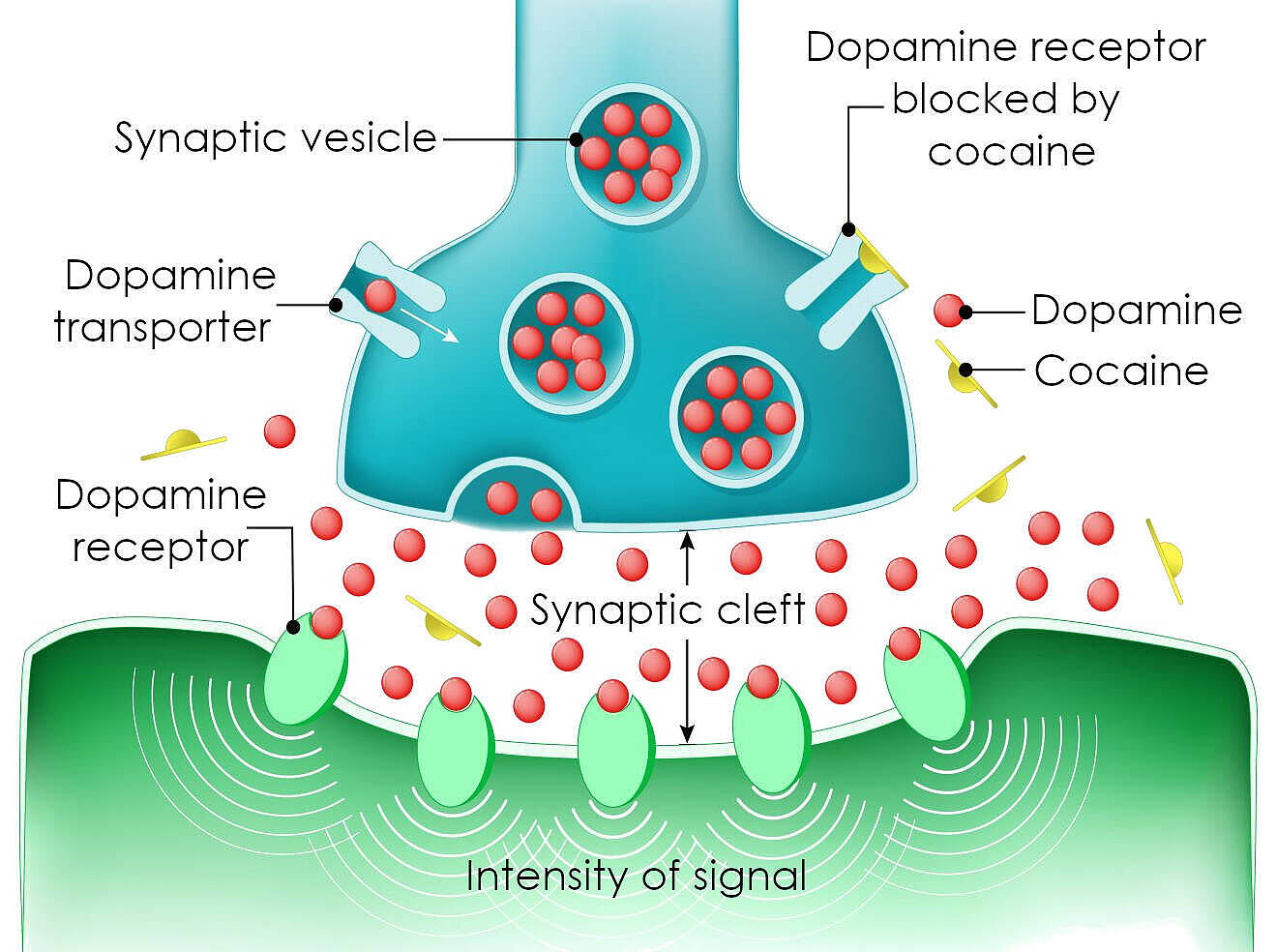
Taking the drug causes euphoria because of the vast levels of the chemical to be released. Repeating the process too often can alter the brain’s reward system, making someone a person with a cocaine addiction.
A new scientific study suggests that the drug’s effects go beyond the dopamine system and that cocaine use significantly impacts brain metabolism.
What happens when someone takes Cocaine:
- As usual, dopamine is released by a neuron into the small gap between two neurons (the synapse), where it binds to dopamine receptors on the neighbouring neuron.
- Another specialised enzyme, a transporter, removes dopamine from the synapse to be recycled for further use.
- The drug binds to the dopamine transporter and blocks the transporter from removing the dopamine from the synapse.
- Dopamine then builds up in the synapse. This is what causes the euphoria commonly experienced immediately after taking the drug.
How to Reduce The Harm
Intranasal (snorting/sniffing)
- Start with a small amount and see how you feel, as purity and strength may vary.
- Don’t share blood-snorting equipment like banknotes, as blood from another’s nose could snort directly into your nasal tissue, putting you at risk of viral hepatitis or HIV.
- Stay hydrated and avoid alcohol.
- If your heart rate is going too fast, you have a high temperature, have chest pains, or are feeling sick, you may be having an overdose.
Smoking Harm Reduction
- Don’t use plastic bottles or cans; switch to glass or metal pipes to avoid inhaling ash, dust or water.
- Use your pipe to avoid virus transmission, i.e. Tuberculosis or hepatitis—Individualise the pipe by marking it with your name.
- Always carry and use your insulated mouthpiece (rubber tube) to prevent exposure to broken or hot pipes.
- Let the pipe cool down before taking your next hit.
Intravenous (injections)
Injecting is probably the most high-risk activity for a cocaine overdose.
- Don’t inject alone; try and use it in a group so others can watch for signs of overdose.
- Ensure you have sufficient amounts of injecting equipment. You can acquire needles at your local ‘needle exchange’ unit.
- Never share needles or any other drug equipment, even mouthpieces.
- Rotate your injecting sites to allow your veins a chance to heal.
- Use as little citric acid as possible, as too much will damage veins
- Return your syringes, barrels and spikes to your local needle exchange.
- Go to the hospital if you have a painful, swollen or dead leg, as it may be deep vein thrombosis.
- Chew gum to stop chewing the insides of the mouth or grinding teeth.
- Bring condoms, as crack use can reduce inhibitions.
Treatment For Cocaine Addiction
Most treatment for cocaine dependence is available in the community. However, you may need to go to a rehabilitation hospital if you have physical or mental health complications or multiple addictions.
Medication
There is currently no compelling evidence to support the effectiveness of any drugs in treating cocaine addiction or alleviating withdrawal symptoms.
Physicians may prescribe alternative medications to alleviate the discomfort experienced during cocaine withdrawal. For instance, sleeping pills could be prescribed to combat insomnia.
There is research to suggest some drugs have a small potential to help with cocaine dependence.
- Disulfiram
- Psychostimulants
- N-acetyl cysteine to help reduce cravings
- antidepressants
- anticonvulsants
- antipsychotics
- dopamine agonists
- baclofen
How is cocaine addiction treated?
There are three stages to overcoming cocaine addiction and abuse. The first is recognising you have an addiction, which is an enormous achievement. The second and third stages are detox and rehab.
If you suspect that you may be struggling with cocaine addiction, it is imperative to seek support without delay.
When you are ready to seek help, please call our friendly admissions team. They are here to guide you and help you take the first step in overcoming cocaine addiction and taking control of your life.
Nobody can be forced to get help, so if you are worried about someone’s cocaine use, contact us to find out more about Cocaine rehab and Cocaine detox. Rest assured, all information shared with us is strictly confidential.

